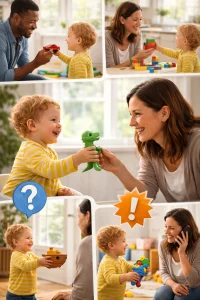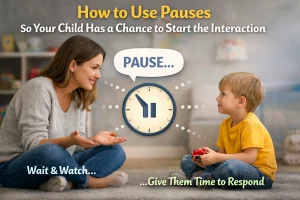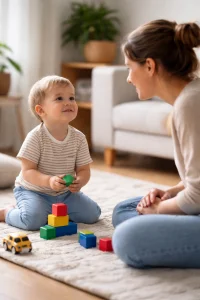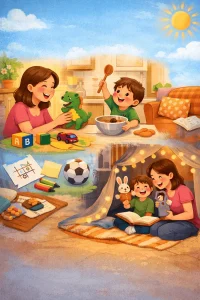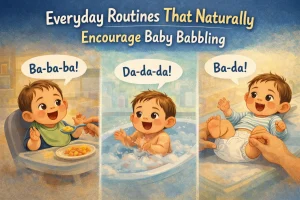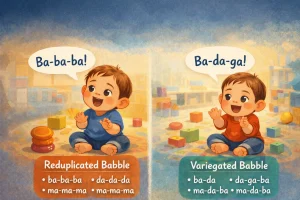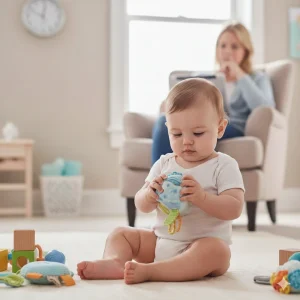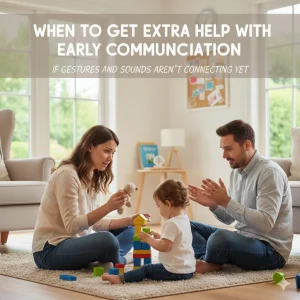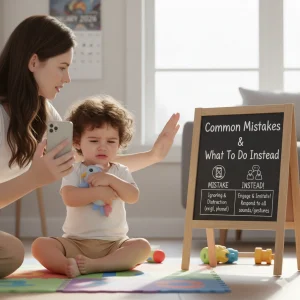Want Your Toddler to Talk More? Try These 7 Tips
By Rajini D
Last Updated: June 25, 2025
“How can I help my toddler start talking more?” The good news is, there are simple, science-backed ways to encourage speech at home — no fancy tools or pressure needed. From playful routines to daily conversations, small changes can make a big impact on your child’s speech development. In this article, we’ll walk you through how to get your toddler to talk more with 7 easy strategies, signs to watch for, and when to seek extra support if needed.
Free Speech Help for Kids
Concerned about speech delays? Book a free consultation with our expert speech therapist and get guidance tailored to your child’s needs.
Why Isn’t My Toddler Talking Much?
It’s a question many parents ask:
“Why isn’t my toddler talking like other kids?”
If that’s been on your mind lately, you’re not alone — and you’re definitely not doing anything wrong. Every toddler grows and learns in their own way. But if your child isn’t talking much yet, it’s natural to feel a bit concerned.
Let’s explore the common reasons toddlers talk late and how to know when to seek support.
Common Reasons Toddlers Don’t Talk Much
Many toddlers say fewer words than expected for their age — and often, it’s not a serious problem. Here are a few common (and often temporary) reasons your toddler may not be talking much:
| Possible Reason | What It Means |
|---|---|
| Late Bloomer | Some toddlers simply take more time to begin talking, even if they understand everything well. |
| Hearing Issues | Even mild ear infections or fluid buildup can affect how they hear sounds, which impacts speech. |
| Bilingual Environment | If your child hears more than one language at home, they might take a little longer to start speaking clearly. |
| Less Verbal Interaction | If your toddler isn’t spoken to or read to often, they may not pick up language as quickly. |
| Temperament | Some kids are naturally more quiet and reserved — they may observe more before speaking. |
Tip: If your toddler understands you, follows simple instructions, and uses gestures — these are all positive signs, even if they aren’t using many words yet.
Late Talker vs. Speech Delay — What’s the Difference?
Understanding the difference between a speech delay in toddlers and a late talker helps you decide whether your child needs early intervention.
Parents often wonder:
“Is my child just a late talker or is this a speech delay?”
Here’s a simple comparison to help:
| Type | What You’ll Notice |
|---|---|
| Late Talker | Usually under age 3, understands language well, uses gestures, but has limited spoken words. Often catches up without therapy. |
| Speech Delay | May struggle with both understanding and using words. Often shows other signs like frustration, no gestures, or poor eye contact. May benefit from speech therapy. |
Remember: A late talker still develops other communication skills — like pointing, showing toys, or reacting to their name.
When to Worry — and When to Wait
It can be hard to know when to take action. Here’s a helpful guide:
Red Flags to Watch For:
- Not using any words by 18 months
- Not putting two words together by age 2
- Doesn’t respond to name or basic instructions
- Rarely uses gestures (like pointing or waving)
- Seems frustrated often due to communication struggles
- Regression (stopping words they previously used)
If your toddler shows these signs, it’s a good idea to talk to a speech-language therapist. Early support can make a big difference.
How to Get Your Toddler to Talk More — 7 Easy Tips That Work
Looking for simple ways to get your toddler to talk more? Great news — you don’t need fancy tools or hours of training. Just your voice, your time, and some playful moments each day can go a long way. These gentle strategies can be used alongside structured speech therapy activities for toddlers that focus on play, music, and interaction..
Let’s explore 7 gentle, effective ways to encourage toddler speech right at home.
1. Talk to Your Toddler Throughout the Day
Use simple words and repeat them often
One of the easiest ways to boost your toddler’s speech is to just talk more — naturally.
- Talk about what you’re doing: “I’m washing your cup. Now I’m drying it.”
- Name what they’re holding: “You have a ball! It’s a red ball.”
- Keep sentences short and simple: Toddlers understand best when words are clear and repeated often.
Tip: Don’t quiz your child. Just describe and label things around you as you go about your day.
2. Read Books With Repeating Words and Phrases
Choose books with rhyme and rhythm
Books are a powerful speech tool — especially ones with rhyming lines or repeated words.
- Choose stories like Brown Bear, Brown Bear or Dear Zoo
- Point to pictures and say the name clearly: “Look, that’s a dog. Woof woof!”
Reading the same book over and over may feel repetitive to you — but for toddlers, that’s exactly what helps them absorb new words.
3. Play With Toys That Spark Words
Play isn’t just fun — it’s a great way to encourage toddler speech.
| Toy Type | How It Helps |
|---|---|
| Pretend Play Sets (kitchen, doctor kit) | Encourage pretend conversations |
| Animal Toys | Practice animal sounds and names |
| Vehicles | Introduce verbs like “go,” “stop,” “crash,” “zoom” |
Let your child lead during play — then you join in with short comments, not long instructions.
4. Wait, Pause, and Encourage Responses
Sometimes the best thing you can do is… pause.
When you ask a question or describe something, give your toddler a few seconds to respond — even if it’s just a sound or gesture.
- Ask: “Do you want apple or banana?”
- Wait 5 seconds. Look expectant.
- If they respond (even slightly), smile and celebrate their effort.
Encouragement builds confidence — and confident toddlers are more likely to keep trying!
5. Use Gestures and Visual Cues
Toddlers don’t just learn by hearing — they also learn by seeing.
- Point to objects when you name them
- Nod your head for “yes,” shake for “no”
- Use basic baby signs like “more” or “all done”
Using gestures along with words helps toddlers understand meaning and eventually say the words themselves.
6. Repeat and Expand on What They Say
This one is simple, powerful, and super effective.
If your child says a word like “ball,” you can say:
“Yes, that’s your big red ball. Let’s bounce the ball!”
- You repeat what they said
- Then add 1–2 words to expand their sentence model
Over time, this helps them go from one-word speech to short phrases and beyond.
7. Sing Simple Songs and Rhymes Together
Music makes language fun — and easier to remember.
- Sing songs with actions like Wheels on the Bus or If You’re Happy and You Know It
- Use gestures to go along with the words
- Encourage them to fill in the blanks: “Twinkle twinkle little ____”
Songs repeat sounds and patterns — a great way for toddlers to build vocabulary without pressure.
Are These Tips Backed by Research? Yes!
If you’re wondering whether these speech tips are just common sense or truly grounded in science — the answer is: yes, they’re evidence-based.
Researchers and speech-language experts agree that the first few years of life are critical for brain development, especially when it comes to language. That’s why these simple, everyday strategies — like talking more, reading together, and waiting for your toddler to respond — are so powerful.
How Do These Strategies Support Brain Development?
Your toddler’s brain is growing rapidly — forming millions of connections every second. These connections, called neural pathways, are shaped by everyday experiences, especially through interaction and language exposure.
Here’s what happens when you use these tips:
| Strategy | Brain Benefit |
|---|---|
| Talking to your child | Builds vocabulary and teaches how sentences work |
| Reading repetitive books | Strengthens memory and sound recognition |
| Waiting for responses | Encourages turn-taking and processing time |
| Singing and rhyming | Supports rhythm, word patterns, and recall |
| Using gestures | Links language with meaning and boosts understanding |
In short: the more your toddler hears and sees language being used, the better their brain gets at learning it.
Why Early Language Stimulation Matters
It’s not just about learning words — early language skills lay the foundation for thinking, learning, social skills, and emotional development. Children who hear more words from caregivers tend to:
- Speak earlier and with more confidence
- Develop stronger listening and comprehension skills
- Do better in school and everyday communication
- Feel more connected through bonding and shared attention
Even just 20–30 minutes of language-rich interaction each day makes a difference. And best of all? It can be done through play, songs, books, and daily routines.
When to Get Professional Help for Your Toddler’s Speech
As a parent, it’s normal to wonder:
“Is this delay just a phase, or should I be concerned?”
You’re not alone in asking this. While many toddlers take their time to talk, there are moments when it’s best to seek expert support — especially if your child is missing key speech development milestones.
Let’s go over the signs that may indicate a speech delay in toddlers and help you decide when it’s time to see a speech therapist.
Red Flags to Watch for in Toddler Speech
While some late talking toddlers eventually catch up, it’s important to monitor their understanding and engagement.
| Age | Red Flag |
|---|---|
| By 12 months | No babbling (like “ba-ba,” “da-da”), not responding to name |
| By 18 months | Not saying even one or two clear words |
| By 2 years | Not combining two words (like “want juice” or “go out”) |
| At any age | No eye contact, doesn’t follow simple instructions, or seems frustrated trying to communicate |
Important: A child who understands everything but doesn’t speak may just be a late talker — but a child who struggles to understand, respond, or show interest in communication could need extra support.
Quick Checklist: Is Your Toddler Behind in Speech?
Use this simple checklist to help assess your child’s speech and language development:
Understanding and Following:
- Responds to name
- Follows simple directions like “Give me the ball”
- Points to familiar objects when named
Speaking:
- Says at least 5–10 words by 18 months
- Uses 2-word phrases by age 2
- Adds new words each month
Interaction:
- Uses gestures like pointing or waving
- Makes eye contact during play or conversation
- Tries to get your attention or express needs
What Can a Speech Therapist Do for My Toddler?
If you’re considering professional help, online speech therapy for toddlers is a flexible and effective option you can access from home. Is it just talking practice? Will it feel like “class” for your child?
The good news is — toddler speech therapy is playful, personalized, and designed to feel like fun. And when started early, it can make a big difference in how your child learns to express themselves confidently.
Speech therapy for toddlers is much more than repeating words. It focuses on helping your child learn to understand, use, and enjoy communication.
Here’s what typically happens in toddler speech therapy:
| Area of Focus | What It Involves |
|---|---|
| Understanding (Receptive Skills) | Teaching your child to follow directions, recognize words, and respond to questions |
| Talking (Expressive Skills) | Building vocabulary, forming sentences, improving clarity |
| Play & Interaction | Using games, toys, songs, and routines to teach communication naturally |
| Non-verbal Support | Encouraging gestures, signs, and eye contact to strengthen early communication |
Therapists use age-appropriate strategies like puppets, picture cards, pretend play, and songs — so sessions feel engaging and stress-free.
Role of Speech Therapists in Early Development
Speech-language therapists (SLPs) don’t just focus on speech — they look at your child’s overall communication, including:
- Language delays
- Speech sound issues (unclear speech)
- Social interaction (eye contact, turn-taking)
- Feeding or oral-motor concerns (if applicable)
They tailor the approach to your child’s age and needs, helping them move step-by-step toward confident communication.
Your Role as a Parent — You’re Part of the Team
One of the most important parts of toddler speech therapy? You.
Therapists don’t just work with your child — they coach you too. This means:
- Watching how your child responds in play
- Learning simple ways to encourage talking at home
- Practicing tips between sessions for faster progress
In fact, studies show that when parents are involved, children make faster and longer-lasting gains in speech development.
How Wellness Hub Helps Toddlers Talk Better
If you’re looking for gentle, effective ways to support your toddler’s speech development — you’re in the right place. At Wellness Hub, we specialize in online speech therapy that’s built for real families, real schedules, and real toddlers.
We know that every child is unique. Our home therapy resources for kids include flashcards, worksheets, and online sessions designed for early speech development..
Here’s what you can expect from our approach to speech support for toddlers:
| What We Offer | Why It Matters |
|---|---|
| Free consultation | Talk to a licensed therapist, understand your child’s needs — no pressure, no commitment |
| Goal-based therapy plans | We build a custom roadmap focused on what your child needs most: more words, clearer speech, better interaction |
| Fun, play-based sessions | Our therapists use songs, toys, and stories to make learning natural and engaging |
| Easy online access | Therapy happens right at home — no travel, no hassle, just comfort and consistency |
| Trusted by thousands | Parents across India and abroad rely on our team for caring, professional, and flexible support |
Whether your toddler is just starting to talk or needs help catching up, we’re here to guide you step by step.
Conclusion
Every toddler learns to talk at their own pace — and that’s okay. Some start early, while others need a little extra help. What matters most is acting early if you notice your child isn’t using words or phrases by age 2. Simple things like talking, reading, and playing can boost speech naturally. And if you’re unsure, don’t wait — support is just a click away.
Frequently Asked Questions:
1. Why is my toddler not talking yet?
Some toddlers talk later than others. This can be due to personality, hearing issues, or needing more time. If your child isn’t saying any words by 18 months, it may be a sign to check with a speech therapist.
2. What age should my toddler start talking?
Most toddlers say a few words by 12–18 months. By 2 years, they usually start joining two words like “want toy.” If that’s not happening, it’s a good idea to look into speech support for toddlers.
3. How can I help my toddler talk more at home?
You can help by:
- Talking to them during everyday activities
- Reading books with repeating words
- Singing simple songs
- Waiting for them to respond
These are proven, evidence-based speech tips for toddlers.
4. Should I worry if my 2-year-old is not talking?
If your 2-year-old isn’t using at least 20–50 words or isn’t combining two words (like “go car”), it’s smart to talk to a speech therapist. Early speech intervention can really help.
5. Is it normal for toddlers to understand but not talk?
Yes, some toddlers understand well but don’t speak much — these are often called “late talkers.” Still, it’s best to monitor progress and get a professional opinion if you’re unsure.
6. Can online speech therapy really work for toddlers?
Yes! With online speech therapy like the one we offer at Wellness Hub, toddlers learn through play, songs, and games — all from the comfort of home. It’s easy for parents to join in too.
7. What does a speech therapist do for toddlers?
A speech therapist helps your toddler:
- Learn new words
- Improve understanding
- Use gestures and simple sentences
They also guide parents with tips that work during play and daily routines.
8. How do I know if my toddler needs speech therapy?
Look for signs like:
- No words by 18 months
- No phrases by age 2
- Doesn’t follow instructions
- Seems frustrated when trying to talk
If you notice these, it’s time to consult a professional.
9. What if I wait and see — will my child catch up later?
Some kids do, but not always. Early help is better because it’s easier for toddlers to learn new skills when their brain is still developing fast. Don’t wait too long to get support.
10. Where can I get speech support for my toddler?
You can visit Wellness Hub and book a free consultation with a speech therapist. We offer goal-based online speech programs that are easy, fun, and trusted by parents in India and worldwide.
About the Author:
Rajini Darugupally
M.Sc., Speech-Language Pathologist (9+ years of experience)
Rajini is a passionate and dedicated Speech-Language Pathologist with over 9+ years of experience, specializing in both developmental speech and language disorders in children and rehabilitation in adults. Driven by a desire to empower each individual to find their voice, Rajini brings a wealth of experience and a warm, genuine approach to therapy. Currently, at Wellness Hub, she thrives in a team environment that values innovation, compassion, and achieving results for their clients.
Book your Free Consultation Today
Parent/Caregiver Info:
Client’s Details:
* Error Message
